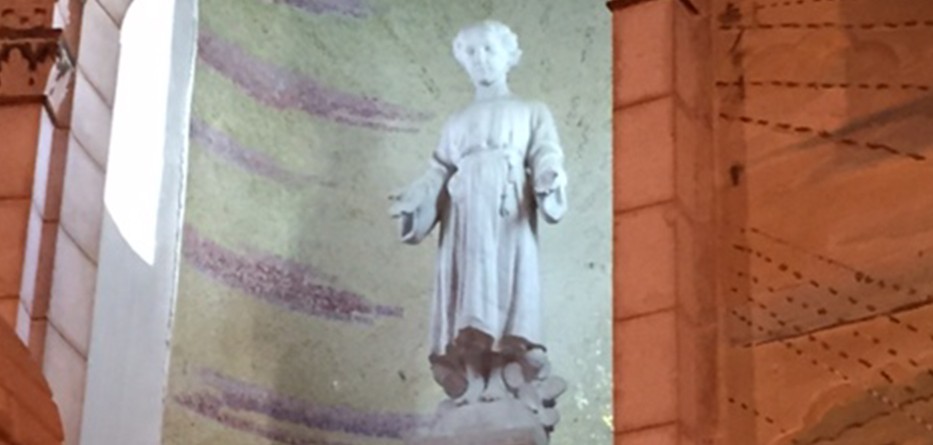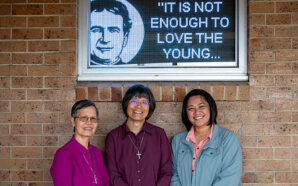Homily for the Twenty-Third Sunday in Ordinary Time
Readings: Ezekiel 33:7-9; Romans 13:8-10; Matthew 18:15-20
6 September 2020
Today is Father’s Day. We salute all fathers, living and deceased. Even the best of fathers acknowledge that no father is perfect. Today we thank God for those of our fathers who embody and teach Paul’s simple statement in the second reading from Romans: “Love is the one thing that cannot hurt your neighbour; that is why it is the answer to every one of the commandments.” Love is the one thing that cannot hurt your child. That is why it is the answer to every one of the contemporary canons for good child-rearing as well as being the embodiment of every tried and tested myth, legend and tradition on how to bring up your kids.
Listen at https://soundcloud.com/frank-brennan-6/homily-6920
In every family, in every community, there are unresolved conflicts; there is sin. In today’s gospel, Matthew sets out the steps for reconciliation. First, “if your brother does something wrong, go and have it out with him alone”. If that works, well and good. If it doesn’t, then call him to the table with a couple of others to help resolve the matter. If that doesn’t work, report the matter to the whole community. If that doesn’t work, show him the door. Expel him or excommunicate him. In each of these steps, the Matthean community, recalling the words of Jesus, was following the traditional contours for conflict resolution in the Judaean world of their time. Then comes the distinctive theological gloss from Jesus: “I tell you solemnly, whatever you bind on earth shall be considered bound in heaven; whatever you loose on earth shall be considered loosed in heaven.” Let’s recall that earlier in the gospel at Capernaum, after Peter had made his profession of faith that Jesus is the Christ, the Son of the Living God, Jesus had entrusted Peter with the keys of the kingdom: “Whatever you bind on earth shall be considered bound in heaven”. Now this power and commission is given to the whole community.
The scripture scholar Daniel Harrington says, “[T]hat power would seem to concern either the imposing (and lifting) of decrees of excommunication or the forgiving (and not forgiving) of sins.” According to Harrington, today’s gospel “outlines a clear procedure designed to help the sinner recognise the sin and return to the community. It roots reconciliation and forgiveness of sins in God’s mercy, and thus reveals the foolishness of those who try to set limits on their willingness to forgive others.” (1)
In our Catholic tradition, the forgiveness of sins has been practised in recent times by the sacrament of confession whereby the penitent confesses their sins to a priest who is bound by the seal of confession. Three years ago, I was called before the Royal Commission into Institutional Responses to Child Sexual Abuse because I had published an article stating that in all my years as a priest, I had never heard the confession of a paedophile and never expected to. I said that any information I gleaned in confession about child sexual abuse was unlikely to be of any forensic value to police, as a penitent behind a screen was unlikely to identify himself, his victim, or the time and place of any offence. I said that any state abolition of the seal of confession would render it even more unlikely that a paedophile would ever present for confession, and would simply take away one very remote possibility that a paedophile might come seeking help which could result in the paedophile being convinced to turn himself in to the authorities.
I appeared at the Royal Commission alongside the respected canon lawyer Fr Ian Waters who explained that the seal of confession covered the sins of the penitent, but not other matters. I agreed with Fr Waters. I gave the example of a little girl Sally who comes to confession and tells me that she stole the jelly beans and that her stepfather did something nasty to her. I said that I could never reveal or act upon Sally’s confession of having stolen the jelly beans, but I could act on Sally’s assertion about her stepfather in the same way as I could if the assertion were made outside confession. It would be a matter of pastoral prudence and care for Sally and her family. There was a difference of opinion on the panel, with the one bishop in attendance, Bishop Terence Curtin who was chair of the Bishops’ Commission for Doctrine and Morals, varying his testimony to agree more with the position put by Fr Waters. I put a suggestion:
FATHER BRENNAN: Could I suggest the appropriate course would be to have Bishop Terry’s committee of the Bishops Conference put in a particular submission to you articulating what is the received theological view of the Catholic Church in Australia on the seal of the confessional?
BISHOP CURTIN: Yes.
THE CHAIR: Will we get one view?
BISHOP CURTIN: Yes, you would.
FATHER BRENNAN: That’s the advantage of a hierarchy, your Honour.
A panel of the most senior archbishops then appeared before the commission a fortnight later. Like many, I expected that by then the bishops would have worked out a clear united position on the limits of the seal of confession. They did not; they publicly disagreed.
The Royal Commission recommended new laws which would abolish the seal of confession. Those laws have now been enacted. The Royal Commission recommended that the Australian bishops consult with the Holy See to clarify whether “information received from a child during the sacrament of reconciliation that they have been sexually abused is covered by the seal of the confessional”. Awaiting this clarification, I have as far as possible avoided hearing individual confessions, unsuccessfully proposing to our bishops that we be permitted more often to practise the communal third rite of reconciliation.
On Friday the bishops finally published the Holy See’s response that the seal includes “all the sins of both the penitent and others known from the penitent’s confession, both mortal and venial, both occult and public, as manifested with regard to absolution and therefore known to the confessor by virtue of sacramental knowledge.” (2) They would say that the seal covers Sally’s disclosure that she was abused by her stepfather.
Australian Catholic priests now need to consider three possible scenarios.
1. What happens if a penitent, now an adult, discloses in confession that he or she when a child was sexually abused by an adult? In confession, I would simply urge the adult penitent to report the past offence to the relevant civil authorities. I would not take any further action. I would not foresee any problem with my complying with the state law while at the same time honouring the seal of confession.
2. What happens if a child penitent discloses in confession that he or she has been sexually abused by a named or identifiable adult? (3) I would treat that information in the same way as if it were disclosed to me outside confession. I would take appropriate action to set in train any mandatory reporting requirements of the state. This would not be a breach of the seal of the confession as I understood the seal to be when I was ordained a priest 35 years ago. It would not be a breach of the seal of confession as I have understood it to be, on receipt of competent canonical advice which I had sought a number of times in the lead up to the royal commission. If my action were now deemed by the Holy See to be a breach of the seal, resulting in my excommunication, I would take heart that Australia’s one canonised saint Mary MacKillop was excommunicated for a time. In good conscience I could take no other path.
3. What happens if a penitent confesses child sexual abuse? I would honour the seal of confession. I would not disclose the abuse to anyone. I would be prepared conscientiously to refuse to comply with the new civil law on the basis that: it works an unwarranted interference with freedom of religion; it is a law which, if anything, will render children less safe; and it is a law which is unenforceable as a prosecution could occur only if the child abuser disclosed to authorities their confession. As Justice Kennedy of the US Supreme Court would say, this law “seems inexplicable by anything but animus toward the class it affects”. (4) In my 35 years as a priest when the civil law honoured the seal of the confession, I never had a paedophile confess his sin to me in confession. Now that the legal privilege over the seal has been withdrawn, I think it all but inconceivable that any abuse will be confessed. Criminal lawyers, family lawyers and investigative journalists, all of whom continue to enjoy a privilege of non-disclosure, are far more likely than a priest in the confessional to hear the details of such abuse.
The only detailed human rights assessment made of the withdrawal of the privilege from priests was by retired Justice Dodds-Streeton who conducted an inquiry for the ACT Government investigating compliance with the ACT Human Rights Act 2004 which is supposed to guarantee “the freedom to demonstrate (one’s) religion or belief in worship, observance, practice and teaching, either individually or as part of a community and whether in public or private”. She concluded, “In our opinion, the imposition of an obligation to report child sexual abuse based on information obtained in or in connection with a religious confession is unlikely to result in many detections of, or successful prosecutions for, either child sexual abuse or breaches of the reporting obligation itself. Where sexual abusers of children are Roman Catholics who would otherwise attend confession, they will probably avoid confession altogether; or alternatively, they may exploit the potential under the rite of confession prevalent in Australia to confess anonymously and non-specifically, in order to avoid disclosures that will lead to their detection or oblige the priest to report.” (5)
If she had any experience of the Catholic rite of confession, she could have added that any penitent is likely to confess in such generic terms as to leave the confessor completely ignorant of all key details of any offence.
In future, I will do all I can to avoid excommunication or breach of the civil law. But I will not put children at risk. I urge our bishops and the participants at the forthcoming plenary council to consider changes to church law in Australia so as to enhance the protection of children and to make the sacrament of reconciliation more fit for purpose in a society which decries the scourge of child sexual abuse and which denies the prospect of rehabilitation of child sex offenders. The Catholic Catechism notes: “The power to “bind and loose” connotes the authority to absolve sins, to pronounce doctrinal judgements, and to make disciplinary decisions in the Church.” (6) We need doctrinal judgements and disciplinary decisions which give highest priority to the protection of innocent children. Our bishops and the plenary council delegates should take as their starting point the Holy See’s expressed desire to ‘spare no effort in collaborating with civil authorities to pursue every avenue to end the scourge of sexual abuse.’
Contrary to the received wisdom of our recent royal commission, I should add that I agree completely with the pastoral and prudential observation of the Holy See:
“It should be recalled also that the confessional provides an opportunity- perhaps the only one – for those who have committed sexual abuse to admit to the fact. In that moment the possibility is created for the confessor to counsel and indeed to admonish the penitent, urging him to contrition, amendment of life and the restoration of justice. Were it to become the practice, however, for confessors to denounce those who confessed to child sexual abuse, no such penitent would ever approach the sacrament and a precious opportunity for repentance and reform would be lost.”
We all have a responsibility to confront and arrest the wickedness of child sexual abuse in our community and in our church. We need to put children first. We need to maintain the hope that every person is redeemable. We must heed those words of Ezekiel in today’s first reading:
If I tell the wicked, “O wicked one, you shall surely die”, and you do not speak out to dissuade the wicked from his way,
the wicked shall die for his guilt,
but I will hold you responsible for his death.
But if you warn the wicked,
trying to turn him from his way,
and he refuses to turn from his way,
he shall die for his guilt,
but you shall save yourself.
Fr Frank Brennan SJ is the Rector of Newman College, Melbourne and the former CEO of Catholic Social Services Australia (CSSA).
[1] Harrington, D. J. (2007). The Gospel of Matthew. (D. J. Harrington, Ed.) (Vol. 1, p. 272). Collegeville, MN: Liturgical Press.
[3] Justice Dodds Stretton, Analysis Report: Implementation Of Royal Commission Into Institutional Responses To Child Sexual Abuse Recommendations Regarding The Reporting Of Child Sexual Abuse, With Implications For The Confessional Seal , 14 January 2019, notes at p. 79: ‘s 327(5) of the Crimes Act 1958 (Vic) and s 316A(2)(f) of the Crimes Act 1900 (NSW) provide for a defence if the victim of an alleged offence does not wish the information to be disclosed, provided that the alleged victim is over the age of 16 (under the Victorian offence) or 18 (under the New South Wales offence). The Victorian offence requires that the victim have capacity to make an informed decision about whether or not the information ought to be disclosed.’
[4] Romer v. Evans, 517 U.S. 620 (1996) at 632
[5] Justice Dodds Stretton, Analysis Report: Implementation Of Royal Commission Into Institutional Responses To Child Sexual Abuse Recommendations Regarding The Reporting Of Child Sexual Abuse, With Implications For The Confessional Seal, 14 January 2019, page 24
[6] Catechism of the Catholic Church, #553, at https://www.vatican.va/archive/ENG0015/__P1L.HTM








